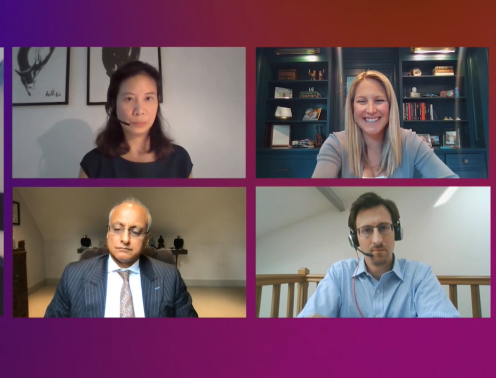Both financial institutions and governments need to ensure their net-zero commitments “have teeth” to help tackle climate change, says TD Securities managing director and global head of sustainable finance and corporate transitions Amy West.

Top left to right: Yulanda Chung, DBS; Amy West, TD Securities; Abyd Karmali, BoA; Laurent Adoult, Credit Agricole
Speaking on a panel at this year’s Sibos conference, West says banks and countries should look to create more standardised climate-focused plans with both short and long-term targets to ensure climate goals are hit.
The panel also discussed the importance of improved sustainability reporting and disclosure agreements to ensure everyone is in sync with regards to the data being collected and reported so firms can more accurately see how they rank among other businesses and be held accountable for their results.
“The net-zero commitments, and we’ve seen dozens of them this year, need to have teeth,” says West.
“We really need to work to understand where the emissions are actually coming from. Secondly, I want to see financial institutions set both short and long-term science-based targets, and this is going to be critical information.
“This data should be data that we’re not just supplying to the market, but this should be data that our investors can look at as capital providers.
“While it may be uncomfortable, it also instils accountability in all large organisations.”
Divestment
More and more financial institutions are looking at innovative new techniques and technologies to move to more green and sustainable processes.
One such solution discussed was blended finance strategies to promote sustainable expansion in developing countries, while Laurent Adoult, managing director and head of sustainable banking at Credit Agricole, stressed the importance of green bond markets and loans and the idea of divestment to ensure business financing takes ESG plans into account to make it difficult for companies without ESG initiatives in place to get funding.
Adoult says: “We’ll get to a critical mass where all investors more or less have to start to incorporate some ESG criteria in the way they manage loans.
“Then as financial institutions, you start to have a significant impact on setting the world on the way to a cleaner economy.”
Looking to the future
The panel closed the session by highlighting the need for cooperation between financial institutions and governments to ensure efforts are not rendered “ineffectual”.
West says: “At the end of the day, we all have to work together to achieve the results, and we’re still going to be hard-pressed to achieve the results that we want to achieve around net zero on the given timeline.
“This can’t just be about the private sector or about the public sector. I think it’s going to be about all of us. It’s going to be about how do we rethink the life cycle of companies? How do we fund disruptive technologies earlier? How do we encourage our existing mature corporates to go down this path of actually revolutionising their business models?
“We have to make sure that we’re engaging with clients, especially our clients that represent some of the biggest sources of emissions. Divestment, while it may be a simple solution and it cleans your own portfolio and what you present to the world, it doesn’t actually reduce emissions in the real economy. And so I think that’s a critical thing that we need to recognise.”
Credit: Source link


Comments are closed.